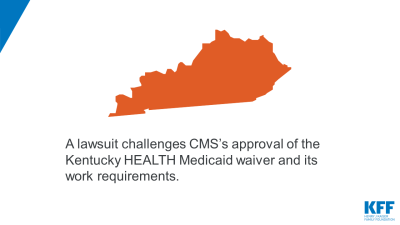 A Guide to the Lawsuit Challenging CMS’s Approval of the Kentucky HEALTH Medicaid Waiver
Issue Brief
A Guide to the Lawsuit Challenging CMS’s Approval of the Kentucky HEALTH Medicaid Waiver
Issue Brief
On January 11, 2018, the Centers for Medicare and Medicaid Services (CMS) issued a State Medicaid Director letter announcing a new policy that, for the 1st time, allows states to condition Medicaid on participation in a work or “community engagement” program. The next day, CMS approved a new Medicaid waiver in Kentucky. The waiver includes a program called Kentucky HEALTH, which encompasses a work requirement as well as coverage lockouts of up to 6 months for failure to pay monthly premiums (up to 4% of income), timely renew eligibility, or timely report a change in circumstances, among other provisions. Kentucky HEALTH applies to most nonelderly adults, including low-income parents and expansion adults. The state plans to implement Kentucky HEALTH by July, 2018. On January 24, 2018, 15 Kentucky Medicaid enrollees filed a lawsuit in the U.S. District Court for the District of Columbia challenging CMS’s authority to issue the work requirement policy and approve the Kentucky waiver. This issue brief answers 5 key questions about the case.